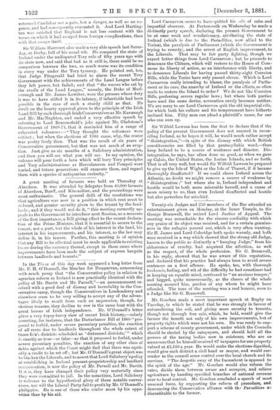In the Ti» es of this day week appeared a
long letter from Mr. F. H. O'Donnell, the Member for Dungarvan, announcing with much pomp that "the Conservative policy in relation to agrarian reform in Ireland is now practically identical with the policy of Mr. Devitt and Mr. Parnell,"—an announcement re- ceived with a good deal of dismay and incredulity in the Con- servative camp, though the Conservatives in Londonderry and elsewhere seem to be very willing to accept any of the advan- tages likely to result from such an' impression, though, for obvious reasons, they decline to row in the same boat with the great heroes of Irish independence. Mr. O'Donnell's letter gives a very topsy-turvy view of recent Irish history,—calmly asserting, for instance, that the Disturbance Bill of 1880" pro- posed to forbid, under severe pecuniary penalties, the exaction of all rents due to landlords throughout the whole extent of those Iris7i districts scheduled as 'distressed districts,'" which is exactly as true—or false—as that it proposed to forbid, under severe pecuniary penalties, the exaction of any other class of debts against which the Court might find that there was equit- ably a credit to be set off ; but Mr. O'Donnell's great object was to blacken the Liberals, and to assert that Lord Salisbury's policy of establishing in Ireland peasant-proprietorship and landlord compensation, is now the policy of Mr. Parnell and Mr. Davitt. If it is, they have changed their policy very materially since they were committed to jail. In the meantime, Lord Salisbury is welcome to the hypothetical glory of these notable conver- sions, nor will the Liberal Party fail to profit by Mr. O'Donnell's philippics. He is one of those who confer more by his oppo- sition than by his. aid.






































 Previous page
Previous page